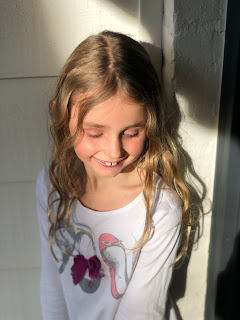When Katie approached her about it, she, like most kids her age would do, denied it. So what did I do?
These are the tough parenting moments when I don't always know how to react. Luckily, Positive Parenting Solutions, my go-to-resource for all things parenting, gave me the tools to feel more effective in the way I handled it.
I did NOT ask her "Did you get into Katie's eyeshadow"? That's a loaded question that ensures your child will lie to you, and you already know the answer, so it accomplishes nothing. Instead, I was very straightforward. I addressed what she did, told her I wasn't mad about what she did but sorry that she felt the need to lie about it. We talk regularly about how lying is worse than telling the truth about doing something bad.
What I did next was the important part of the response. I didn't have to question why she did what she did. I know. She is interested in makeup. She asked for a makeup kit for Christmas, but I didn't give her one. I didn't give her makeup because all I could envision was a pile of broken eyeshadow caked into her rug....
So, here's what I said, "I know you're interested in makeup. I'm guessing that's why you were playing with Katie's makeup. How about we make a deal? Anytime you want to play with makeup, just ask, and we can do it."
So, we got out my newest Beauty Counter eye palette, and we played makeup. I piled on tons of eyeshadow and bronzer, and she loved it.
Here are the tips that Positive Parenting Solutions gives to handle lying and the tools I used (not perfectly but from memory) to handle the situation. I hope these will help you in handling similar situations with your children.
1. Keep calm and parent on. Watch how you respond to misbehavior and mistakes in your home, whether it’s spilled juice on the carpet or unfinished chores. If your kids worry about being yelled at or punished when they mess up, they won’t want to come to you with the truth. Focus on using a calm voice – yes, it can be tough, but it’s possible. That doesn’t mean kids are off the hook for lying. But instead of getting angry and assigning blame, discuss solutions to the problem with your child.
2. Don’t set up a lie. If you can see piles of laundry on your daughter’s floor, don’t ask her if she’s cleaned up her room yet. When we ask questions to which we already know the answer, we’re giving our children the opportunity to tell a lie. Instead, emphasize ways to address the situation. If you know Evan hasn’t touched his homework, ask him, “What are your plans for finishing your homework?” Instead of “Where did all this mud come from?” ask, “What can we do to clean this up and make sure it doesn’t happen next time?” This can help head off a power struggle and allows your child to save face by focusing on a plan of action instead of fabricating an excuse. It also teaches a lesson of what they can do next time – sitting down with homework right after school or taking off their shoes in the mudroom instead of the living room – to avoid problems.
3. Get the whole truth. While we may want to put our child on the spot when we catch them in a lie, accusing or blaming them will only make things worse. Getting to the root of the problem and understanding why she couldn’t be honest with you will help you encourage your child to tell the truth in the future. Open up a conversation gently, saying, “that sounds like a story to me. You must be worried about something and afraid to tell the truth. Let’s talk about that. What would help you be honest?” You can use the information you glean to help her be more truthful in the future.
4. Celebrate honesty. Even if you’re upset that there’s a sea of water on the bathroom floor because your daughter tried to give her dolls a bath in the sink, commend her for coming to you and telling the truth. Tell her, “I really appreciate you telling me what really happened. That must have been difficult for you, but I really appreciate you telling the truth and taking responsibility.”
5. Delight in do-overs. Think of mistakes as a way to learn how to make better choices. When we stay calm and avoid yelling or punishing our kids for mistakes, our kids will be more likely to admit their slip-ups in the future. Turn the mistake into a learning opportunity. Ask, “If you could have a do-over, what would you do differently?” and brainstorm different ideas. If someone else was affected – maybe he broke his sister’s scooter – ask what he can do to make it right with the other party.
6. Show the love. Let your kids know you love them unconditionally, even when they make mistakes. Make sure they know that while you don’t like their poor behavior, you will never love them any less because of the mistakes they might make. This helps your kids feel safe opening up to you.
7. Walk the talk. Remember that your kids are always looking to you and learning from your actions. Those little white lies we tell, whether it’s to get out of dog sitting for the neighbors or helping with the school fundraiser, aren’t harmless – they’re showing your kids that it’s okay to lie.



No comments:
Post a Comment